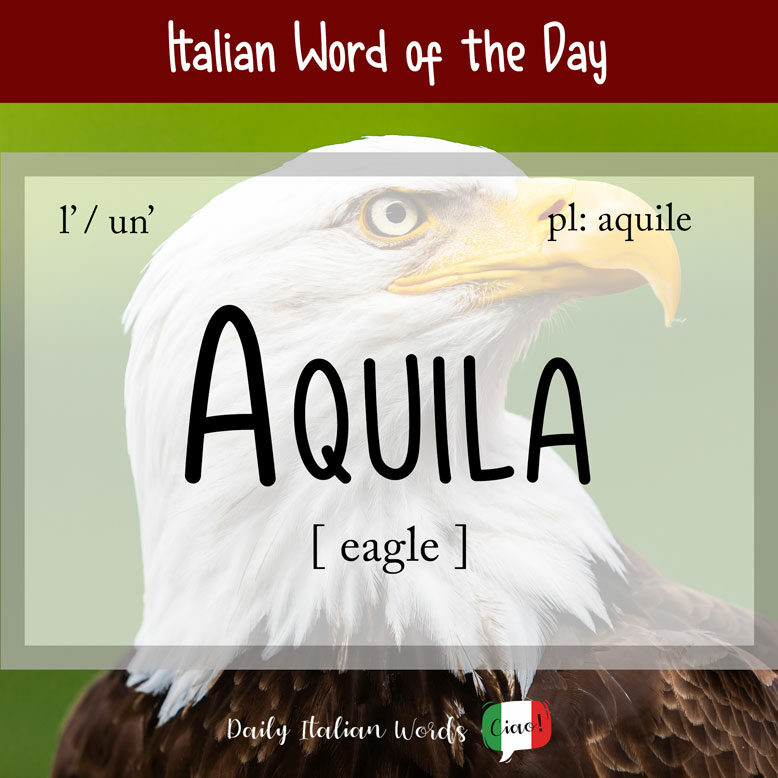The Italian word for eagle is aquila. Both the Italian and English terms share the same origin, which is the Latin aquila.
aquila
eagle

Because aquila is a feminine noun that starts with a vowel, it takes the following definite and indefinite articles:
l’aquila
the eagle
un’aquila
an eagle
le aquile
the eagles
delle aquile
(some) eagles
Two of the most well-known eagles in the world are the aquila reale (golden eagle, lit. ‘royal eagle’) and the aquila di mare testabianca (bald eagle), also mistakenly called aquila calva from the translation of the English term (calva = bald).
In picchiata, l’aquila reale può superare i trecento chilometri orari!
The golden eagle can dive at speeds of over 300 kilometres an hour.

Here are some common parts of an aquila, translated into Italian:
- Beak – Becco
- Claw / Talon – Artiglio
- Feather – Piuma
- Wing – Ala
- Tail – Coda
- Eye – Occhio
- Head – Testa
- Chest / Breast – Petto
- Back – Dorso
- Leg – Zampa
- Plumage – Piumaggio
- Crest (some species) – Cresta
Italy has several eagle species, mostly living in the Alps, Apennines, and large natural reserves. Here are the main ones:
- Aquila reale (Golden Eagle) – The most widespread eagle in Italy, found in the Alps and Apennines.
- Aquila di Bonelli (Bonelli’s Eagle) – A rarer species, mainly in Sicily and southern Italy.
- Biancone (Short-toed Eagle) – Specialises in hunting snakes; migratory, found in central and southern regions.
- Aquila imperiale orientale (Eastern Imperial Eagle) – Very rare in Italy, mostly a winter visitor.
- Aquila anatraia minore (Lesser Spotted Eagle) – Occasionally seen in migration, not a common breeder.
Did you know that…?
The word for kite in Italian is aquilone, which is the combination of aquila and the augmentative suffix -one meaning “big”. In other words, aquilone literally translates as “big eagle”!
Note, however, that if you want to talk about the bird, such as the red kite for example, the Italian word is nibbio. (Red kite translates as nibbio reale.)
L’Aquila (the article is an integral part of the name) is a city in the Abruzzo region in central Italy.
Aquile are renowned for their exceptional eyesight and intelligence, so it should come as little surprise that the word has received the figurative meaning of “genius”. However, its usage is limited to negative statements suggesting the opposite, such as:
Giulio non è proprio un’aquila in matematica.
Giulio isn’t exactly a math genius.
Just as we say eagle-eyed in English to describe someone who is very observant, you can use the expressions occhio d’aquila (eagle eye), sguardo d’aquila (eagle look), and vista d’aquila (eagle sight) in Italian.
Finally, a nido d’aquila (eagle’s nest) can refer to a lonely place on top of a mountain, whereas the idiomatic expression avere la vecchiaia dell’aquila (lit. to have the old age of an eagle) means that an elderly person is in good health and lives a respectable life.
Heather Broster is a graduate with honours in linguistics from the University of Western Ontario. She is an aspiring polyglot, proficient in English and Italian, as well as Japanese, Welsh, and French to varying degrees of fluency. Originally from Toronto, Heather has resided in various countries, notably Italy for a period of six years. Her primary focus lies in the fields of language acquisition, education, and bilingual instruction.


